How to spot fake emails like "Donation From Lottery Winner"
Phishing/ScamAlso Known As: Donation From Lottery Winner scam email
Get free scan and check if your device is infected.
Remove it nowTo use full-featured product, you have to purchase a license for Combo Cleaner. Seven days free trial available. Combo Cleaner is owned and operated by RCS LT, the parent company of PCRisk.com.
What kind of scam is "Donation From Lottery Winner"?
After reviewing this email, we found that it was sent by scammers who aim to extort money and (or) information from recipients. It is disguised as a letter from someone who supposedly won a lottery and is willing to share the prize with others. Recipients should ignore this scam email.
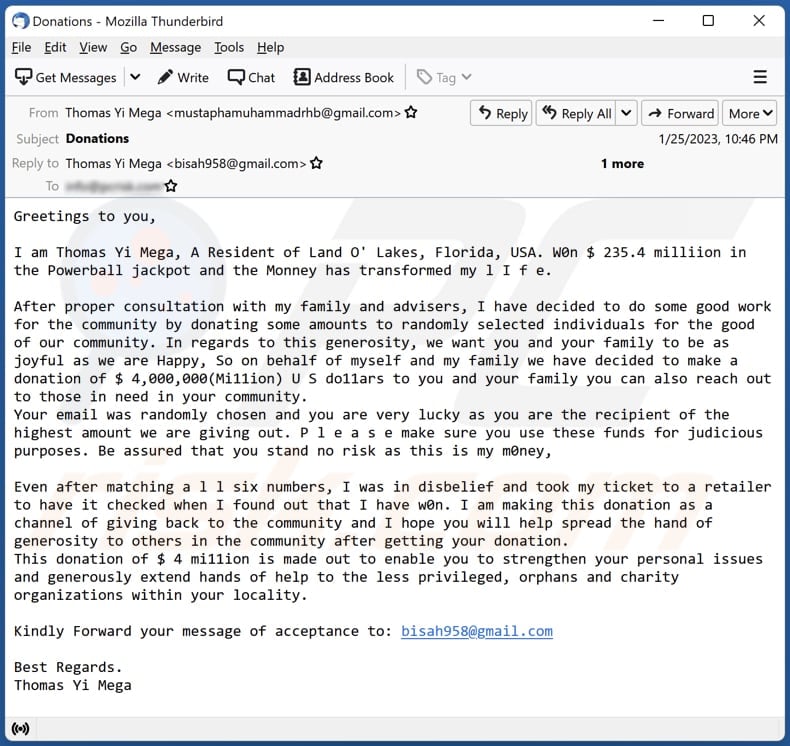
More about the "Donation From Lottery Winner" scam email
Scammers behind this letter pretend to be Thomas Yi Mega, who recently won a substantial amount in the Powerball jackpot. They claim that this person is willing to share his good fortune with the community by making generous donations to randomly selected individuals.
They state that the recipient of this letter has been chosen to receive 4 million dollars. In order to accept the donation, the recipient is prompted to respond to the provided email address (bisah958@gmail.com).
Typically, scammers behind such scams aim to trick people into sending money (e.g., paying an "administration" fee) or personal information in exchange for a large sum of money. People who fall for such scams never receive any money. On the contrary, they lose money and (or) become victims of identity theft or encounter other problems.
| Name | Donation From Lottery Winner Email Scam |
| Threat Type | Phishing, Scam, Social Engineering, Fraud |
| Fake Claim | The recipient has been chosen as a winner of 4 million dollars. |
| Disguise | Letter from a Powerball jackpot winner. |
| Symptoms | Unauthorized online purchases, changed online account passwords, identity theft, illegal access of the computer. |
| Distribution methods | Deceptive emails, rogue online pop-up ads, search engine poisoning techniques, misspelled domains. |
| Damage | Loss of sensitive private information, monetary loss, identity theft. |
| Malware Removal (Windows) |
To eliminate possible malware infections, scan your computer with legitimate antivirus software. Our security researchers recommend using Combo Cleaner. Download Combo CleanerTo use full-featured product, you have to purchase a license for Combo Cleaner. 7 days free trial available. Combo Cleaner is owned and operated by RCS LT, the parent company of PCRisk.com. |
Similar scam emails in general
Scammers behind scam emails usually try to obtain credit card details, ID card information, social security numbers, login credentials, or other information and (or) extract money from unsuspecting recipients. They pretend to be real people or legitimate companies, organizations, or other entities.
Examples of scam emails are "New Security Features Email Scam", "Fund Transfer Assistance Email Scam", and "Thank You For Shopping With Apple Email Scam". Cybercriminals also use email to lure recipients into infecting computers with malware.
How do spam campaigns infect computers?
Threat actors who use email to deliver malware seek to trick recipients into downloading and executing malware by themselves. They send malicious files or links to pages hosting malware. Examples of files used to distribute malware are malicious MS Office, PDF documents, archives, JavaScript, executables, and ISO files.
How to avoid installation of malware?
Avoid opening links and files in irrelevant emails sent from unknown addresses. Emails of this kind could contain malware. Download software from reputable sources such as official pages and verified stores. Do not click ads displayed on questionable websites.
Keep the operating system and installed software updated. Never use third-party tools to update (and activate) any software. Use reputed antivirus software. Scan a computer for threats regularly. If you've already opened malicious attachments, we recommend running a scan with Combo Cleaner Antivirus for Windows to automatically eliminate infiltrated malware.
Text presented in the "Donation From Lottery Winner" email letter:
Subject: Donations
Greetings to you,
I am Thomas Yi Mega, A Resident of Land O' Lakes, Florida, USA. W0n $ 235.4 milliion in the Powerball jackpot and the Monney has transformed my l I f e.
After proper consultation with my family and advisers, I have decided to do some good work for the community by donating some amounts to randomly selected individuals for the good of our community. In regards to this generosity, we want you and your family to be as joyful as we are Happy, So on behalf of myself and my family we have decided to make a donation of $ 4,000,000(Mi11ion) U S do11ars to you and your family you can also reach out to those in need in your community.
Your email was randomly chosen and you are very lucky as you are the recipient of the highest amount we are giving out. P l e a s e make sure you use these funds for judicious purposes. Be assured that you stand no risk as this is my m0ney,Even after matching a l l six numbers, I was in disbelief and took my ticket to a retailer to have it checked when I found out that I have w0n. I am making this donation as a channel of giving back to the community and I hope you will help spread the hand of generosity to others in the community after getting your donation.
This donation of $ 4 mi11ion is made out to enable you to strengthen your personal issues and generously extend hands of help to the less privileged, orphans and charity organizations within your locality.Kindly Forward your message of acceptance to: bisah958@gmail.com
Best Regards.
Thomas Yi Mega
Other examples of emails claiming that the sender is going to donate millions of dollars:
Sample 1:
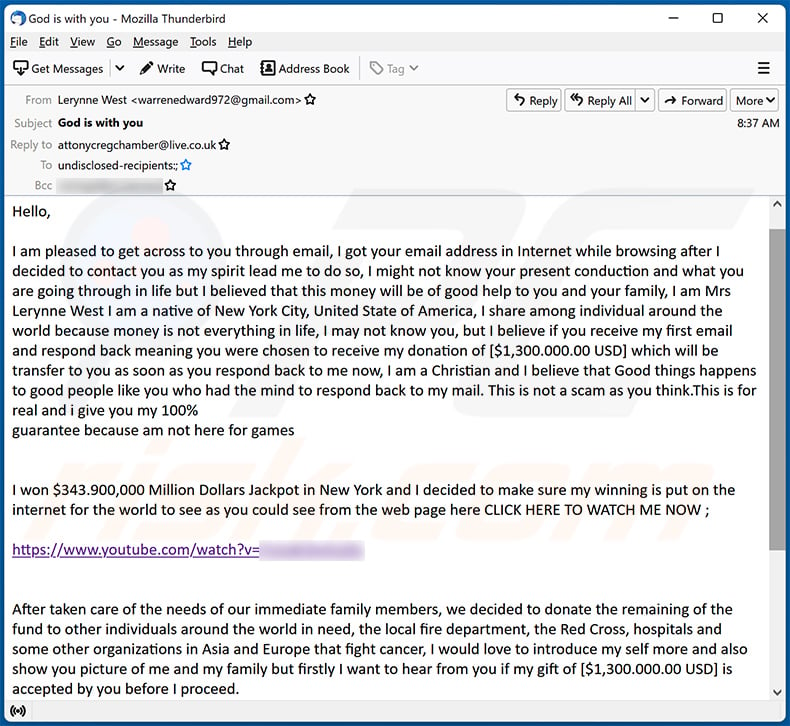
Text presented within:
Subject: God is with you
Hello,
I am pleased to get across to you through email, I got your email address in Internet while browsing after I decided to contact you as my spirit lead me to do so, I might not know your present conduction and what you are going through in life but I believed that this money will be of good help to you and your family, I am Mrs Lerynne West I am a native of New York City, United State of America, I share among individual around the world because money is not everything in life, I may not know you, but I believe if you receive my first email and respond back meaning you were chosen to receive my donation of [$1,300.000.00 USD] which will be transfer to you as soon as you respond back to me now, I am a Christian and I believe that Good things happens to good people like you who had the mind to respond back to my mail. This is not a scam as you think.This is for real and i give you my 100%
guarantee because am not here for games
I won $343.900,000 Million Dollars Jackpot in New York and I decided to make sure my winning is put on the internet for the world to see as you could see from the web page here CLICK HERE TO WATCH ME NOW ;
-After taken care of the needs of our immediate family members, we decided to donate the remaining of the fund to other individuals around the world in need, the local fire department, the Red Cross, hospitals and some other organizations in Asia and Europe that fight cancer, I would love to introduce my self more and also show you picture of me and my family but firstly I want to hear from you if my gift of [$1,300.000.00 USD] is accepted by you before I proceed.
THIS IS YOUR DONATION CODE: [ IN GOD WE TRUST ]Send me back the DONATION CODE by responding back to this email , I shall send you more emails as soon as I get the donation code back from you
Thank you for accepting our offer, we are indeed grateful. We anticipate your earliest response.
Best Regard
Lerynne West
Sample 2:
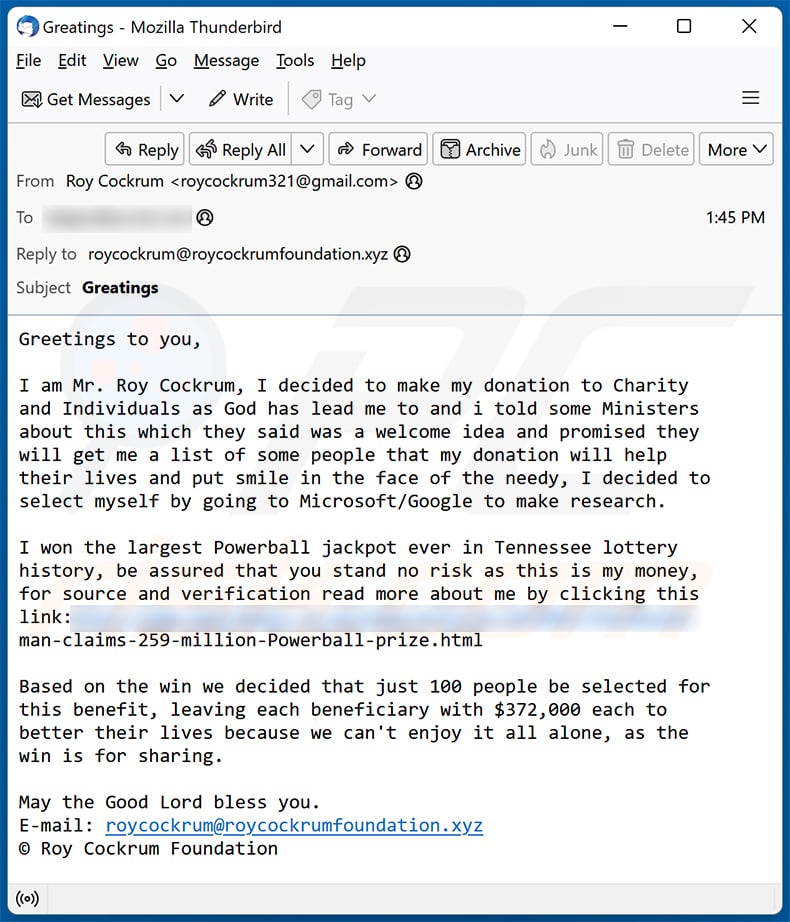
Text presented within:
Subject: Greatings
Greetings to you,
I am Mr. Roy Cockrum, I decided to make my donation to Charity
and Individuals as God has lead me to and i told some Ministers
about this which they said was a welcome idea and promised they
will get me a list of some people that my donation will help
their lives and put smile in the face of the needy, I decided to
select myself by going to Microsoft/Google to make research.I won the largest Powerball jackpot ever in Tennessee lottery
history, be assured that you stand no risk as this is my money,
for source and verification read more about me by clicking this
link:-Based on the win we decided that just 100 people be selected for
this benefit, leaving each beneficiary with $372,000 each to
better their lives because we can't enjoy it all alone, as the
win is for sharing.May the Good Lord bless you.
E-mail: roycockrum@roycockrumfoundation.xyz
© Roy Cockrum Foundation
Sample 3:
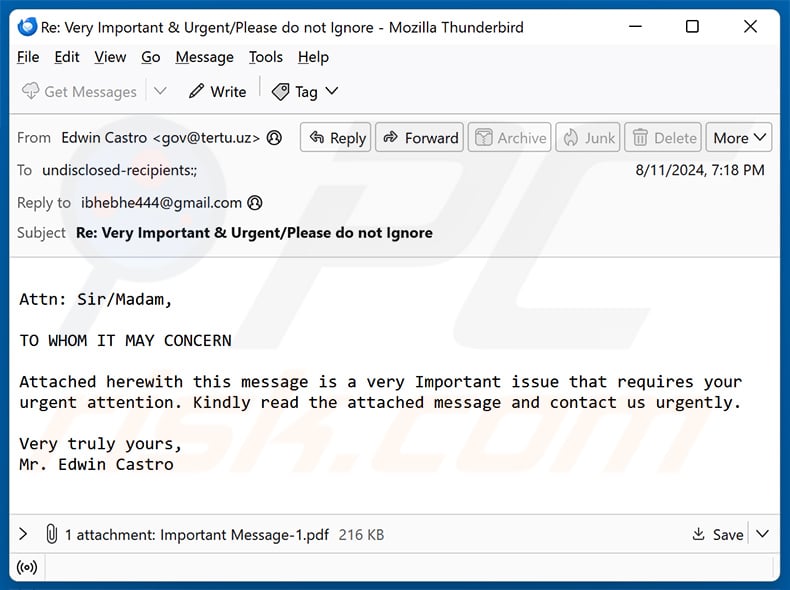
Text presented within:
Subject: Re: Very Important & Urgent/Please do not Ignore
Attn: Sir/Madam,TO WHOM IT MAY CONCERN
Attached herewith this message is a very Important issue that requires your urgent attention. Kindly read the attached message and contact us urgently.
Very truly yours,
Mr. Edwin Castro
Screenshot of the attached PDF document offering the donation:
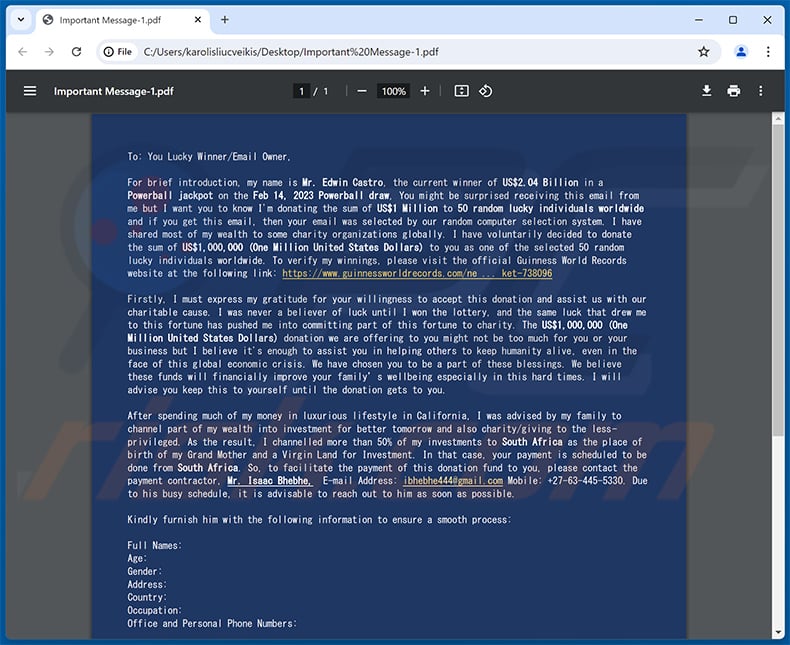
Text presented within:
To: You Lucky Winner/Email Owner,
For brief introduction, my name is Mr. Edwin Castro, the current winner of US$2.04 Billion in a
Powerball jackpot on the Feb 14, 2023 Powerball draw, You might be surprised receiving this email from
me but I want you to know I'm donating the sum of US$1 Million to 50 random lucky individuals worldwide
and if you get this email, then your email was selected by our random computer selection system. I have
shared most of my wealth to some charity organizations globally. I have voluntarily decided to donate
the sum of US$1,000,000 (One Million United States Dollars) to you as one of the selected 50 random
lucky individuals worldwide. To verify my winnings, please visit the official Guinness World Records
website at the following link: hxxps://www.guinnessworldrecords.com/ne ... ket-738096
Firstly, I must express my gratitude for your willingness to accept this donation and assist us with our
charitable cause. I was never a believer of luck until I won the lottery, and the same luck that drew me
to this fortune has pushed me into committing part of this fortune to charity. The US$1,000,000 (One
Million United States Dollars) donation we are offering to you might not be too much for you or your
business but I believe it's enough to assist you in helping others to keep humanity alive, even in the
face of this global economic crisis. We have chosen you to be a part of these blessings. We believe
these funds will financially improve your family’s wellbeing especially in this hard times. I will
advise you keep this to yourself until the donation gets to you.
After spending much of my money in luxurious lifestyle in California, I was advised by my family to
channel part of my wealth into investment for better tomorrow and also charity/giving to the lessprivileged. As the result, I channelled more than 50% of my investments to South Africa as the place of
birth of my Grand Mother and a Virgin Land for Investment. In that case, your payment is scheduled to be
done from South Africa. So, to facilitate the payment of this donation fund to you, please contact the
payment contractor, Mr. Isaac Bhebhe, E-mail Address: ibhebhe444@gmail.com Mobile: +27-63-445-5330. Due
to his busy schedule, it is advisable to reach out to him as soon as possible.
Kindly furnish him with the following information to ensure a smooth process:
Full Names:
Age:
Gender:
Address:
Country:
Occupation:
Office and Personal Phone Numbers:
I sincerely hope that this donation brings happiness to you and your family as I wish you a joyous
celebration in advance.
Best Regards.
Mr. Edwin Castro.
Remain Blessed Charity Donation.
Our Beneficiaries are as follows: Heart Foundations for heart related problems, Victims of Wars and Other Global Conflicts,
Natural Causes and Natural Disasters such as, epidemics, Tsunamis, earthquakes, storms, typhoons and floods, Orphanages and less
privileged homes, motherless babies homes, old aged homes and Victims of Incurable diseases.
Note: If you find this email in your SPAM/JUNK folder, it may be due to restrictions imposed by your Internet Service Provider.
Please consider moving it to your inbox and treat it as a genuine message.
Sample 4:
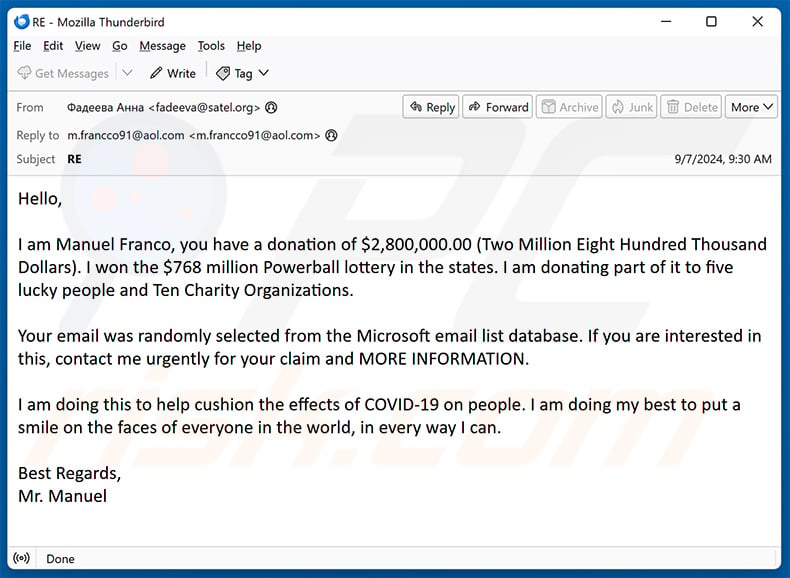
Text presented within:
Subject: RE
Hello,
I am Manuel Franco, you have a donation of $2,800,000.00 (Two Million Eight Hundred Thousand Dollars). I won the $768 million Powerball lottery in the states. I am donating part of it to five lucky people and Ten Charity Organizations.
Your email was randomly selected from the Microsoft email list database. If you are interested in this, contact me urgently for your claim and MORE INFORMATION.
I am doing this to help cushion the effects of COVID-19 on people. I am doing my best to put a smile on the faces of everyone in the world, in every way I can.
Best Regards,
Mr. Manuel
Sample 5:
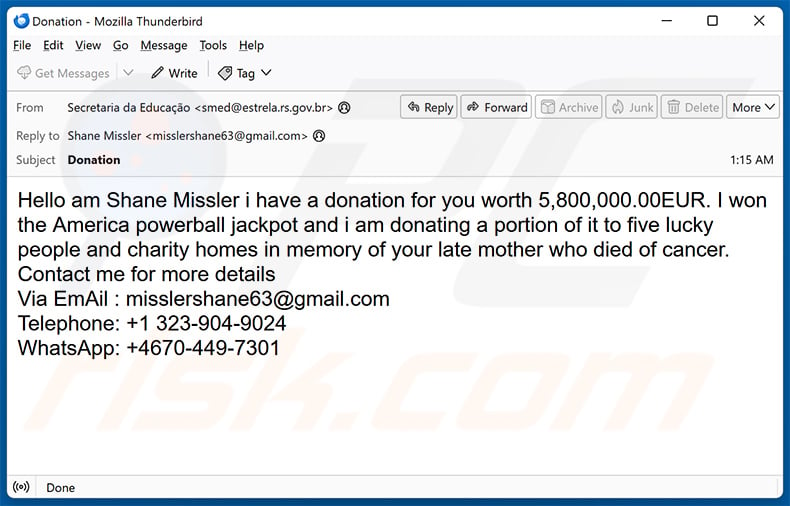
Text presented within:
Subject: Donation
Hello am Shane Missler i have a donation for you worth 5,800,000.00EUR. I won the America powerball jackpot and i am donating a portion of it to five lucky people and charity homes in memory of your late mother who died of cancer. Contact me for more details
Via EmAil : misslershane63@gmail.com
Telephone: +1 323-904-9024
WhatsApp: +4670-449-7301
Sample 6:
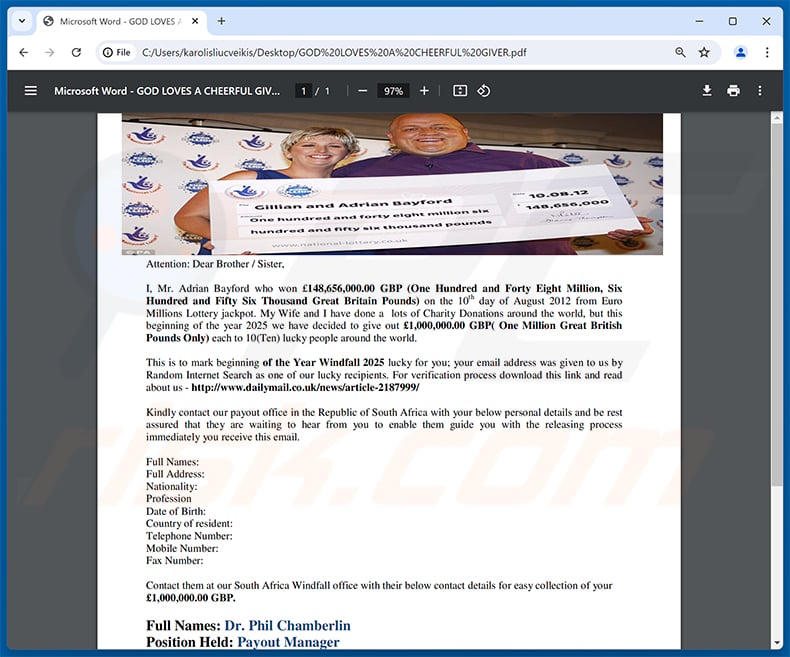
Text presented within:
Attention: Dear Brother / Sister,
I, Mr. Adrian Bayford who won £148,656,000.00 GBP (One Hundred and Forty Eight Million, Six
Hundred and Fifty Six Thousand Great Britain Pounds) on the 10th day of August 2012 from Euro
Millions Lottery jackpot. My Wife and I have done a lots of Charity Donations around the world, but this
beginning of the year 2025 we have decided to give out £1,000,000.00 GBP( One Million Great British
Pounds Only) each to 10(Ten) lucky people around the world.
This is to mark beginning of the Year Windfall 2025 lucky for you; your email address was given to us by
Random Internet Search as one of our lucky recipients. For verification process download this link and read
about us - http://www.dailymail.co.uk/news/article-2187999/
Kindly contact our payout office in the Republic of South Africa with your below personal details and be rest
assured that they are waiting to hear from you to enable them guide you with the releasing process
immediately you receive this email.
Full Names:
Full Address:
Nationality:
Profession
Date of Birth:
Country of resident:
Telephone Number:
Mobile Number:
Fax Number:
Contact them at our South Africa Windfall office with their below contact details for easy collection of your
£1,000,000.00 GBP.
Full Names: Dr. Phil Chamberlin
Position Held: Payout Manager
Telephone Number: +27 (0) 718440314
Fax Number: +27 (0) 718440314
Email Address :{ xbzxeuk@outlook.com}
Finally, do use the above information to contact them and please for GOD sake if you do not feel
comfortable about this beginningof the Year Windfall from Mr. and Mrs. Bayford, delete it
immediately, as our motto in this world since GOD blessed us in this manner is to help eradicate
poverty in this world in our own little way.
Thank you so much for been part of our wonderful celebration in this year 2025.
MR. ADRIAN AND GILLIAN BAYFORD,
(FOR THE FAMILY)
Sample 6:
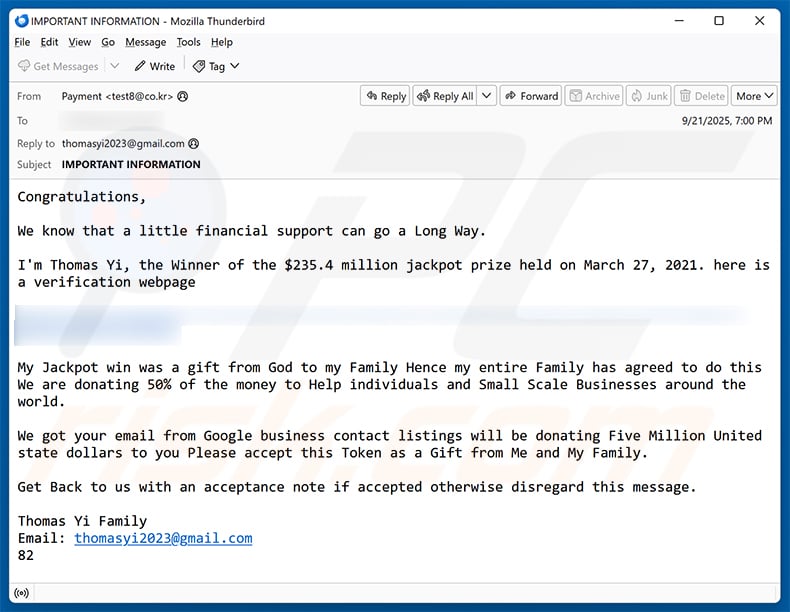
Text presented within:
Subject: IMPORTANT INFORMATION
Congratulations,
We know that a little financial support can go a Long Way.
I'm Thomas Yi, the Winner of the $235.4 million jackpot prize held on March 27, 2021. here is a verification webpage
-
My Jackpot win was a gift from God to my Family Hence my entire Family has agreed to do this
We are donating 50% of the money to Help individuals and Small Scale Businesses around the world.We got your email from Google business contact listings will be donating Five Million United state dollars to you Please accept this Token as a Gift from Me and My Family.
Get Back to us with an acceptance note if accepted otherwise disregard this message.
Thomas Yi Family
Email: thomasyi2023@gmail.com
Instant automatic malware removal:
Manual threat removal might be a lengthy and complicated process that requires advanced IT skills. Combo Cleaner is a professional automatic malware removal tool that is recommended to get rid of malware. Download it by clicking the button below:
DOWNLOAD Combo CleanerBy downloading any software listed on this website you agree to our Privacy Policy and Terms of Use. To use full-featured product, you have to purchase a license for Combo Cleaner. 7 days free trial available. Combo Cleaner is owned and operated by RCS LT, the parent company of PCRisk.com.
Quick menu:
- What is Donation From Lottery Winner scam email?
- Types of malicious emails.
- How to spot a malicious email?
- What to do if you fell for an email scam?
Types of malicious emails:
![]() Phishing Emails
Phishing Emails
Most commonly, cybercriminals use deceptive emails to trick Internet users into giving away their sensitive private information, for example, login information for various online services, email accounts, or online banking information.
Such attacks are called phishing. In a phishing attack, cybercriminals usually send an email message with some popular service logo (for example, Microsoft, DHL, Amazon, Netflix), create urgency (wrong shipping address, expired password, etc.), and place a link which they hope their potential victims will click on.
After clicking the link presented in such email message, victims are redirected to a fake website that looks identical or extremely similar to the original one. Victims are then asked to enter their password, credit card details, or some other information that gets stolen by cybercriminals.
![]() Emails with Malicious Attachments
Emails with Malicious Attachments
Another popular attack vector is email spam with malicious attachments that infect users' computers with malware. Malicious attachments usually carry trojans that are capable of stealing passwords, banking information, and other sensitive information.
In such attacks, cybercriminals' main goal is to trick their potential victims into opening an infected email attachment. To achieve this goal, email messages usually talk about recently received invoices, faxes, or voice messages.
If a potential victim falls for the lure and opens the attachment, their computers get infected, and cybercriminals can collect a lot of sensitive information.
While it's a more complicated method to steal personal information (spam filters and antivirus programs usually detect such attempts), if successful, cybercriminals can get a much wider array of data and can collect information for a long period of time.
![]() Sextortion Emails
Sextortion Emails
This is a type of phishing. In this case, users receive an email claiming that a cybercriminal could access the webcam of the potential victim and has a video recording of one's masturbation.
To get rid of the video, victims are asked to pay a ransom (usually using Bitcoin or another cryptocurrency). Nevertheless, all of these claims are false - users who receive such emails should ignore and delete them.
How to spot a malicious email?
While cyber criminals try to make their lure emails look trustworthy, here are some things that you should look for when trying to spot a phishing email:
- Check the sender's ("from") email address: Hover your mouse over the "from" address and check if it's legitimate. For example, if you received an email from Microsoft, be sure to check if the email address is @microsoft.com and not something suspicious like @m1crosoft.com, @microsfot.com, @account-security-noreply.com, etc.
- Check for generic greetings: If the greeting in the email is "Dear user", "Dear @youremail.com", "Dear valued customer", this should raise suspiciousness. Most commonly, companies call you by your name. Lack of this information could signal a phishing attempt.
- Check the links in the email: Hover your mouse over the link presented in the email, if the link that appears seems suspicious, don't click it. For example, if you received an email from Microsoft and the link in the email shows that it will go to firebasestorage.googleapis.com/v0... you shouldn't trust it. It's best not to click any links in the emails but to visit the company website that sent you the email in the first place.
- Don't blindly trust email attachments: Most commonly, legitimate companies will ask you to log in to their website and to view any documents there; if you received an email with an attachment, it's a good idea to scan it with an antivirus application. Infected email attachments are a common attack vector used by cybercriminals.
To minimise the risk of opening phishing and malicious emails we recommend using Combo Cleaner Antivirus for Windows.
Example of a spam email:

What to do if you fell for an email scam?
- If you clicked on a link in a phishing email and entered your password - be sure to change your password as soon as possible. Usually, cybercriminals collect stolen credentials and then sell them to other groups that use them for malicious purposes. If you change your password in a timely manner, there's a chance that criminals won't have enough time to do any damage.
- If you entered your credit card information - contact your bank as soon as possible and explain the situation. There's a good chance that you will need to cancel your compromised credit card and get a new one.
- If you see any signs of identity theft - you should immediately contact the Federal Trade Commission. This institution will collect information about your situation and create a personal recovery plan.
- If you opened a malicious attachment - your computer is probably infected, you should scan it with a reputable antivirus application. For this purpose, we recommend using Combo Cleaner Antivirus for Windows.
- Help other Internet users - report phishing emails to Anti-Phishing Working Group, FBI’s Internet Crime Complaint Center, National Fraud Information Center and U.S. Department of Justice.
Frequently Asked Questions (FAQ)
Why did I receive this email?
As a rule, such letters are not personal. Scammers send the same letter to everyone (all recipients receive the same email).
I have provided my personal information when tricked by this email, what should I do?
If you have provided login credentials (e.g., usernames and passwords), change all passwords immediately. If scammers have obtained your credit card details, ID card information, social security number, or other details, contact corresponding authorities as soon as possible.
I have downloaded and opened a malicious file attached to this email, is my computer infected?
Malicious files do not always infect computers immediately after opening them. It depends on the file type. For instance, malicious MS Office documents infect computers after enabling macros commands.
I have sent cryptocurrency to the address presented in such email, can I get my money back?
Unfortunately, crypto transactions are irreversible. Therefore, it is impossible to retrieve transferred crypto funds.
I have read the email but did not open the attachment, is my computer infected?
It is safe to open emails without opening links or files in them.
Will Combo Cleaner remove malware infections that were present in email attachment?
Combo Cleaner will scan a computer for threats and remove detected malware. This app is capable of detecting almost all known malware. High-end malware usually hides deep in the system. Thus, computers must be scanned using a full system scan to eliminate such malware.
Share:

Tomas Meskauskas
Expert security researcher, professional malware analyst
I am passionate about computer security and technology. I have an experience of over 10 years working in various companies related to computer technical issue solving and Internet security. I have been working as an author and editor for pcrisk.com since 2010. Follow me on Twitter and LinkedIn to stay informed about the latest online security threats.
PCrisk security portal is brought by a company RCS LT.
Joined forces of security researchers help educate computer users about the latest online security threats. More information about the company RCS LT.
Our malware removal guides are free. However, if you want to support us you can send us a donation.
DonatePCrisk security portal is brought by a company RCS LT.
Joined forces of security researchers help educate computer users about the latest online security threats. More information about the company RCS LT.
Our malware removal guides are free. However, if you want to support us you can send us a donation.
Donate
▼ Show Discussion